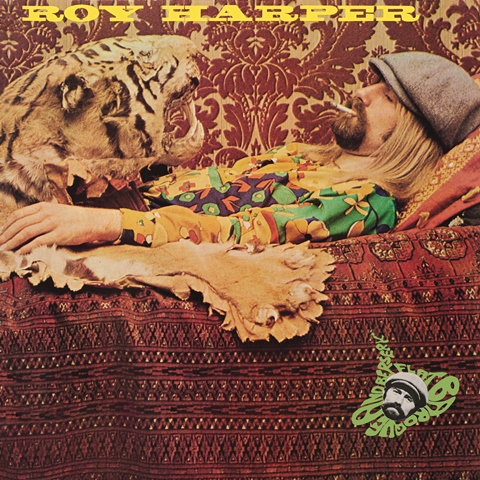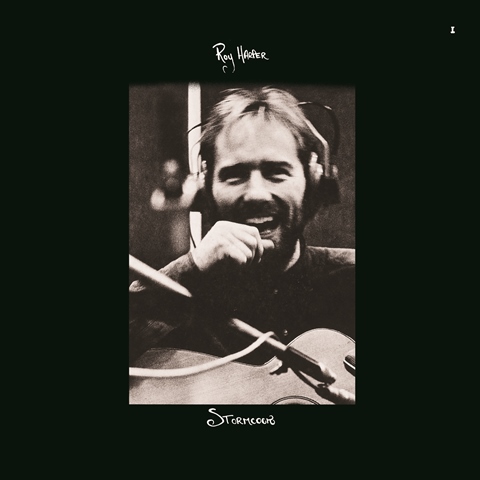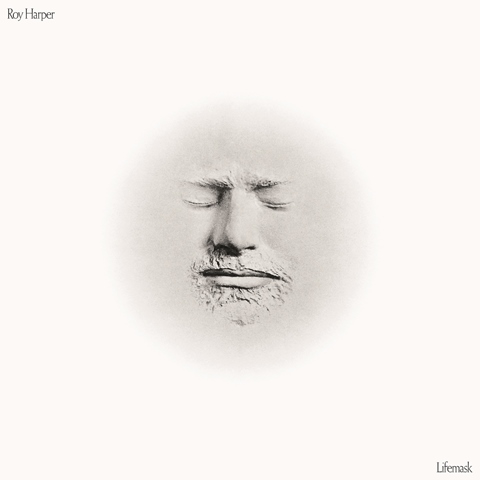Reissue CDs Weekly: Roy Harper | reviews, news & interviews
Reissue CDs Weekly: Roy Harper
Reissue CDs Weekly: Roy Harper
Smart self-issued editions welcome wilful singer-songwriter back to the fray

Man & Myth, released in September 2013, was Roy Harper’s best album in two decades. The live shows which came on its back were stunning. Amongst this activity – instead of building on the momentum – he was arrested and charged with historic sexual abuse. Police had contacted him about allegations in February 2013. Following an innocent verdict, all other charges were dropped in November 2015.
Of the ordeal, Harper said “I have now been acquitted on all the charges that were brought. This case should never have gone as far as this, or taken so long to resolve. I lost my livelihood and I spent my savings and more, on my defence. Despite coming out of this without a blemish on my name, I cannot recoup my costs and that’s left me incredibly angry. I’m now going to restart my working life where I left off nearly three years ago.”
 He has restarted his working life and resumed playing live. He has also, on his own Science Friction label, issued limited, vinyl-only editions of the first three albums he recorded for EMI’s Harvest imprint: Flat Baroque and Berserk (1970), Stormcock (1971) and Lifemask (1973) – Harper’s fourth, fifth and sixth albums. Each reissue comes with good liner notes, in a repro of the original sleeve and is remastered with great sympathy.
He has restarted his working life and resumed playing live. He has also, on his own Science Friction label, issued limited, vinyl-only editions of the first three albums he recorded for EMI’s Harvest imprint: Flat Baroque and Berserk (1970), Stormcock (1971) and Lifemask (1973) – Harper’s fourth, fifth and sixth albums. Each reissue comes with good liner notes, in a repro of the original sleeve and is remastered with great sympathy.
A comparison of the new Flat Baroque and Berserk and Stormcock to first pressings (I don’t have one of Lifemask) shows that the sound has been opened out rather than rendered anew. Clearly, original pressings and their EQ were referenced in the new remasterings. It as if each album has been refreshed by removing a light layer of sonic murk – one which was not discernable until now.
Anyone looking for a traditional linear progression or development over the three albums will be disappointed. Harper was wilful and each is unashamedly scattershot. This is not to say they are not good: each is and, in its own way, essential to Harper’s catalogue, with Stormcock the all-time classic. Each though is defined by a particularly literate anger: at specifics (Stormcock’s “Hors D'Oeuvres” is a commentary on the Caryl Chessman case; the title of Flat Baroque and Berserk’s “I Hate the White Man” is self-explanatory) and at the human condition in general.
 Despite being his calling card with EMI, Flat Baroque and Berserk was hardly an album the label could easily market. Intimate, almost whispered reflections are set against strident songs during which he all-but attacks his acoustic guitar. The album ends with its only rocker “Hell’s Angels”, which dissolves into (presumably) stoned laughter. On the sleeve, he is reclining, looking into the jaws of a tiger.
Despite being his calling card with EMI, Flat Baroque and Berserk was hardly an album the label could easily market. Intimate, almost whispered reflections are set against strident songs during which he all-but attacks his acoustic guitar. The album ends with its only rocker “Hell’s Angels”, which dissolves into (presumably) stoned laughter. On the sleeve, he is reclining, looking into the jaws of a tiger.
Stormcock was and is defined by the track which took up the second part of side two – the reason it should be heard as an album rather than a CD. Orchestrated by David Bedford and running for 13 minutes, “Me and My Woman” was an allegorical examination of where the Sixties had gone in the form of a love song – a “where-are-we-now”. It was deeply serious and seriously impactful. Jimmy Page’s contribution to side one’s anti-organised religion "Same Old Rock" also attracted attention. If an entry point into Harper is needed, this album is it.
 Lifemask was and is harder to get a handle on. The just-short of 23-minutes “The Lord’s Prayer” (also featuring Page) is an intense, almost stream of consciousness song-poem portmanteau piece on the state of the world – or rather, the state of the post-Sixties world as Harper saw it. Much of the album revisited songs composed for the 1972 film Made, in which he appeared as rock singer Mike Preston alongside a single mother played by the ever-typecast Carol White. The album is bitty, does not hang together and radiates stress. Unsurprising, as it was recorded just after Harper was diagnosed with the blood condition hemorrhagic telangiectasia and informed he had seven years to live.
Lifemask was and is harder to get a handle on. The just-short of 23-minutes “The Lord’s Prayer” (also featuring Page) is an intense, almost stream of consciousness song-poem portmanteau piece on the state of the world – or rather, the state of the post-Sixties world as Harper saw it. Much of the album revisited songs composed for the 1972 film Made, in which he appeared as rock singer Mike Preston alongside a single mother played by the ever-typecast Carol White. The album is bitty, does not hang together and radiates stress. Unsurprising, as it was recorded just after Harper was diagnosed with the blood condition hemorrhagic telangiectasia and informed he had seven years to live.
Now 75, Harper has long outlived his doctor’s predication. In itself, that is cause for celebration. Even more so is that he has returned to the fray. His next moves with new music are eagerly awaited. But until they are revealed, these reissues will do just fine.
Share this article
The future of Arts Journalism
You can stop theartsdesk.com closing!
We urgently need financing to survive. Our fundraising drive has thus far raised £49,000 but we need to reach £100,000 or we will be forced to close. Please contribute here: https://gofund.me/c3f6033d
And if you can forward this information to anyone who might assist, we’d be grateful.

Subscribe to theartsdesk.com
Thank you for continuing to read our work on theartsdesk.com. For unlimited access to every article in its entirety, including our archive of more than 15,000 pieces, we're asking for £5 per month or £40 per year. We feel it's a very good deal, and hope you do too.
To take a subscription now simply click here.
And if you're looking for that extra gift for a friend or family member, why not treat them to a theartsdesk.com gift subscription?
more New music
 Soulwax’s 'All Systems Are Lying' lays down some tasty yet gritty electro-pop
Belgian dancefloor veterans return to the fray with a dark, pop-orientated sound
Soulwax’s 'All Systems Are Lying' lays down some tasty yet gritty electro-pop
Belgian dancefloor veterans return to the fray with a dark, pop-orientated sound
 Music Reissues Weekly: Marc and the Mambas - Three Black Nights Of Little Black Bites
When Marc Almond took time out from Soft Cell
Music Reissues Weekly: Marc and the Mambas - Three Black Nights Of Little Black Bites
When Marc Almond took time out from Soft Cell
 Album: Mobb Deep - Infinite
A solid tribute to a legendary history
Album: Mobb Deep - Infinite
A solid tribute to a legendary history
 Album: Boz Scaggs - Detour
Smooth and soulful standards from an old pro
Album: Boz Scaggs - Detour
Smooth and soulful standards from an old pro
 Emily A. Sprague realises a Japanese dream on 'Cloud Time'
A set of live improvisations that drift in and out of real beauty
Emily A. Sprague realises a Japanese dream on 'Cloud Time'
A set of live improvisations that drift in and out of real beauty
 Trio Da Kali, Milton Court review - Mali masters make the ancient new
Three supreme musicians from Bamako in transcendent mood
Trio Da Kali, Milton Court review - Mali masters make the ancient new
Three supreme musicians from Bamako in transcendent mood
 Hollie Cook's 'Shy Girl' isn't heavyweight but has a summery reggae lilt
Tropical-tinted downtempo pop that's likeable if uneventful
Hollie Cook's 'Shy Girl' isn't heavyweight but has a summery reggae lilt
Tropical-tinted downtempo pop that's likeable if uneventful
 Pop Will Eat Itself's 'Delete Everything' is noisy but patchy
Despite unlovely production, the Eighties/Nineties unit retain rowdy ebullience
Pop Will Eat Itself's 'Delete Everything' is noisy but patchy
Despite unlovely production, the Eighties/Nineties unit retain rowdy ebullience
 Music Reissues Weekly: The Earlies - These Were The Earlies
Lancashire and Texas unite to fashion a 2004 landmark of modern psychedelia
Music Reissues Weekly: The Earlies - These Were The Earlies
Lancashire and Texas unite to fashion a 2004 landmark of modern psychedelia
 Odd times and clunking lines in 'The Life of a Showgirl' for Taylor Swift
A record this weird should be more interesting, surely
Odd times and clunking lines in 'The Life of a Showgirl' for Taylor Swift
A record this weird should be more interesting, surely
 Waylon Jennings' 'Songbird' raises this country great from the grave
The first of a trove of posthumous recordings from the 1970s and early 1980s
Waylon Jennings' 'Songbird' raises this country great from the grave
The first of a trove of posthumous recordings from the 1970s and early 1980s

Add comment